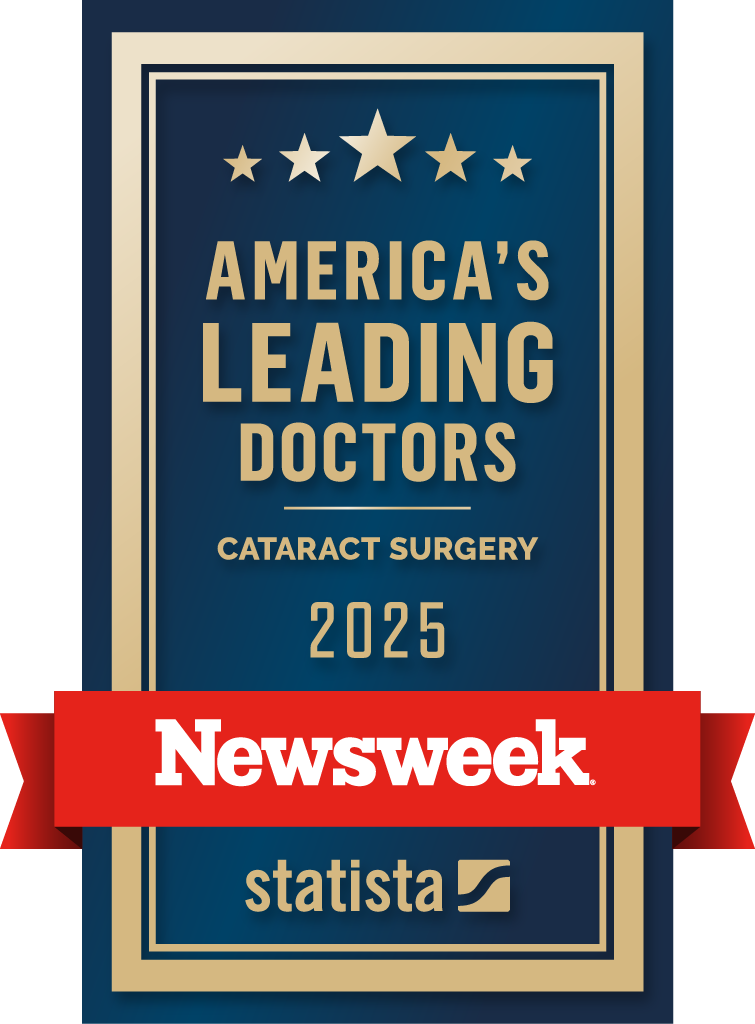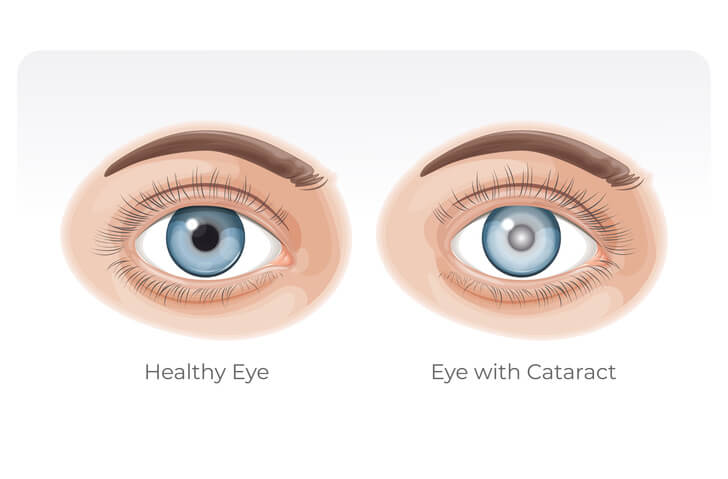

Cataracts are cloudy areas in the lens of your eye. Think of it as your car windshield getting damaged and needing replacement.
When you have a cataract, your vision will become less colorful and gradually more hazy. That’s because your eye lens focuses light rays onto the back of your eye to create an image of what you’re looking at. When the lens is cloudy, light rays can’t easily pass through it, so it needs to be removed and replaced with an artificial lens.
Cataracts can be caused by various things. The most common cause is your eye’s natural aging process. The proteins in your eye lens will break down and get worse over time, causing progressively worse vision.
Other causes of cataracts include genetics, medications, and diabetes.
Symptoms of CataractsThere are other signs of cataracts beyond having cloudy or blurry vision. Other symptoms include seeing a ghosted or double image out of the eye that has the cataract. You might also notice you’re more sensitive to light, especially when driving at night.
You could have difficulties with your sight in general when it’s nighttime, especially if it is raining. You could also need additional lights or lamps if you read in the evening.
Bright colors could also appear faded. They might take on a yellow tinge as well. It’s important to contact your eye doctor if you notice any of these symptoms.
Our SpecialistYour eye doctor will evaluate and test your eyes to see if you have cataracts. Some tests they may perform include:
Visual acuity test – You probably know this test at the “eye chart exam.” You will be asked to read letters from a distance with one eye and then the other. A glare test may also be done using the eye chart. You may be asked to read the chart under different lighting conditions. Difficulty identifying the letters under bright lights is typically indicative of cataracts.
Slit-lamp exam – A bright light and magnification allow the doctor to see different parts of your eye–the cornea, the iris, and the lens.
Retinal exam – Using drops to dilate your pupils, your doctor will be able to examine the cataracts and the retina, the part of your eye that enables the conversion of light to create an image in your brain.
If cataracts aren’t affecting your quality of life, surgery may not be the first thing your cataract doctor recommends. You and your doctor will decide if cataract surgery is right for you. There isn’t a big rush to get rid of cataracts because they don’t harm your eyes. If you can’t perform your normal activities because of cataracts, consider getting surgery.
Surgery is the most often used form of cataract treatment if eye glasses are not able to improve your vision. Your eye specialist will remove the affected lens and replace it with a new one. The lens is put in the same spot as your normal lens and becomes a permanent aspect of your eye.
There are two types of artificial lenses eye doctors use — standard or basic lenses and advanced technology lenses. Most people will frequently wear glasses or daily contact lenses after their surgery if they have standard lenses. These lenses usually do not have an out-of-pocket cost to patients.
Advanced technology lenses will decrease dependency on spectacles or contact lenses. These lenses have an out-of-pocket cost to patients.
Some patients have other eye issues where they can’t use an artificial lens. In these cases, your doctor might prescribe contact lenses or glasses to correct the other issues once the cataract is removed.
Experienced cataract specialists might talk about advanced technology or premium lens implants as part of your treatment plan for cataracts. These lenses are designed to decrease dependency of wearing contact lenses or glasses while getting rid of your cataracts. The advanced technology used in premium lens implants helps you focus better and decrease eye irregularities (like astigmatism). Advanced technology intraocular lenses are not meant to eliminate contact lens or spectacle lens use 100%, but they do decrease dependency on them.
For patients considering intraocular lens implants, Lehigh Eye Specialists offers a wide range of choices, including the Light-Adjustable Lens (LAL) which allows for power adjustments after surgery. We are the only practice in the region to offer this type of lens. You might want to pursue advanced technology lens implants if you want to decrease your dependency on glasses or contact lenses. (This technology requires an out-of-pocket cost to patients.)
Light Adjustable LensVision impairment has been shown to have a significant impact on quality of life. Blurred or cloudy vision can limit an individual’s activities, strain social interactions, and pose safety risks. Our cataract specialist, Dr. David DeRose, is the #1 choice for cataract surgery and premium lens implants in Allentown, Bethlehem, Easton, and surrounding areas. He and his specialized team are passionate about helping patients regain a better quality of life through better vision. They enjoy working with patients to create the best plan to achieve their individual vision goals.
Our Doctors Patient ResourcesDr. David DeRose, our cataract specialist, is the #1 choice for cataract surgery and premium lens implants in Allentown, Bethlehem, Easton and surrounding areas. Learn more about Dr. DeRose and his experience here.
About Dr. DeRose About Our Practice